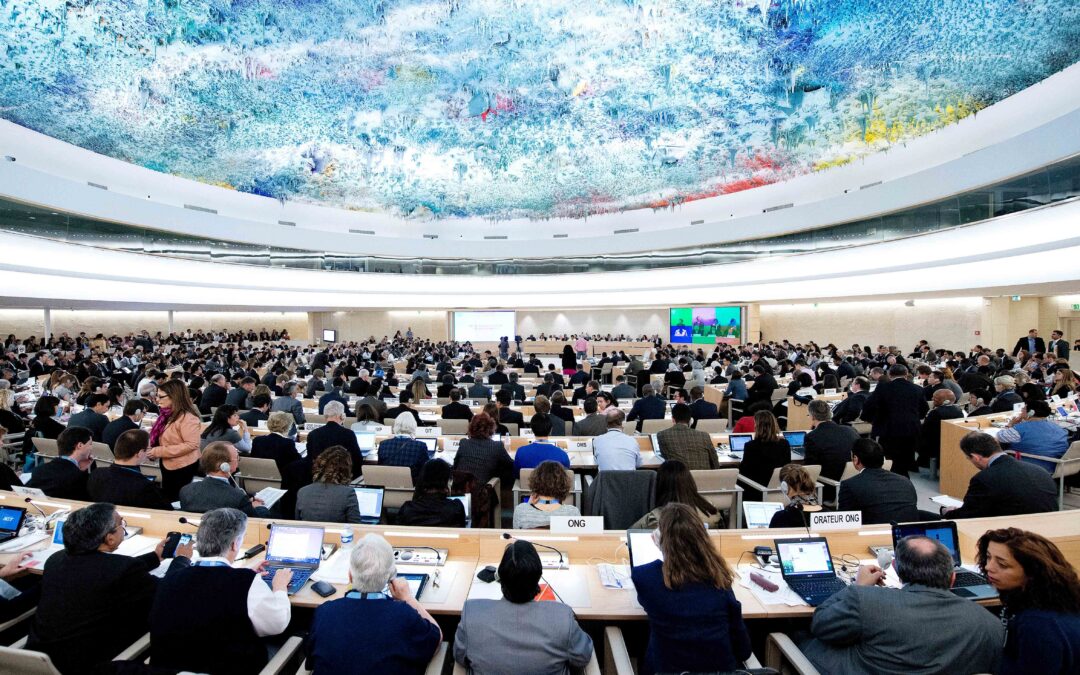
Jul 6, 2018 | Advocacy, News, Non-legal submissions
The ICJ today joined other NGOs in highlighting key outcomes of the 38th ordinary session of the UN Human Rights Council.
The statement, delivered by International Service for Human Rights (ISHR) at the end of the session, read as follows (text in italics was not read aloud due to the limited time available):
“Our organisations welcome the adoption of the resolutions on civil society space, peaceful protest, on violence against women and girls and on discrimination against women and girls and the Council’s rejection of attempts to impede progress on protecting civic space, peaceful protest and the rights to sexual and reproductive health.
On civil society space, the resolution recognizes the essential contribution that civil society makes to international and regional organisations and provides guidance to States and organisations on improving their engagement with civil society. On peaceful protest, it sets out in greater detail how international law and standards protect rights related to protests.
On violence against women and on discrimination against women, we consider that ensuring sexual and reproductive health and rights are vital in efforts to combat violence and discrimination against women, online and offline, as well as to ensure targeted and specific remedies to victims. We appreciate that the work of women human rights defenders towards this is recognised.
We consider the adoption of the resolution on the contribution of the Council to the prevention of human rights violations as an important opportunity to advance substantive consideration on strengthening the Council’s ability to deliver on its prevention mandate.
Following challenging negotiations, we welcome the adoption by consensus of the resolution on human rights and the Internet, reaffirming that the same rights that people have offline must also be protected online, and calling on States to tackle digital divides between and within countries, emphasising the importance of tools for anonymity and encryption for the enjoyment of human rights online, in particular for journalists, and condemning once more all measures that prevent or disrupt access to information online.
We welcome continued Council attention to Eritrea‘s abysmal human rights record. This year’s resolution, while streamlined, extends expert monitoring of, and reporting on, the country and outlines a way forward for both engagement and human rights reform. We urge Eritrea to engage in long-overdue meaningful cooperation.
We welcome the renewal of the mandate of the Special Rapporteur on Belarus under item 4 with an increased vote – as it is still the only independent international mechanism to effectively monitor human rights violations in Belarus – while remaining concerned over a narrative to shift the mandate to item 10 in the absence of any systemic change in Belarus.
We welcome the consensus resolution on the DRC, putting in place continued monitoring and follow up on the expert’s recommendations on the Kasais. However, given violations and abuses throughout several regions in the country, occurring against the backdrop of an ongoing political crisis, delayed elections, and the brutal quashing of dissent, we urge the Council to promptly move towards putting in place a country-wide mechanism that can respond to events on the ground as they emerge.
We welcome the strong resolution on Syria, which condemns violations and abuses by all parties, and appropriately addresses concerns raised by the COI about the use of chemical weapons, sexual and gender-based violence, and the need to address situations of detainees and disappearances. The Council cannot stay silent in the face of continued atrocities as the conflict continues unabated into its seventh year.
We welcome the joint statements delivered this session on Cambodia, the Philippines, and Venezuela. We urge Council members and observers to work towards increased collective action to urgently address the dire human rights situations in these countries.
On the Philippines, we emphasise that the Council should establish an independent international investigation into extrajudicial killings in the ‘war on drugs’ and mandate the OHCHR to report on the human rights situation and on moves toward authoritarianism.
The joint statement on Cambodia represents a glimmer of hope after the Council’s failure to take meaningful action against clear sabotage of democratic space ahead of elections. Close scrutiny of the human rights situation before, during and after the elections is paramount and the Council must take immediate action on current and future human rights violations in this regard.
We welcome the joint statement delivered by Luxembourg calling on the HRC President to provide oral updates on cases of alleged intimidation or reprisal, including actions taken, at the start of the Item 5 general debate of each Council session and also provide States concerned with the opportunity to respond.
Finally, the new Council member to replace the United States of America should demonstrate a principled commitment to human rights, to multilateralism and to addressing country situations of concern by applying objective criteria.
Signatories:
- Asian Forum for Human Rights and Development (FORUM-ASIA)
- The Association for Progressive Communications
- The Center for Reproductive Rights (CRR)
- CIVICUS: World Alliance for Citizen Participation
- DefendDefenders (the East and Horn of Africa Human Rights Defenders Project)
- Human Rights House Foundation (HRHF)
- International Commission of Jurists (ICJ)
- The International Lesbian, Gay, Bisexual, Trans and Intersex Association (ILGA)
- International Service for Human Rights (ISHR)
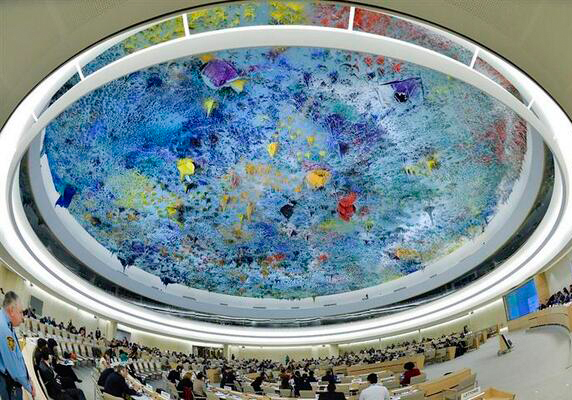
Jul 5, 2018 | Advocacy, Non-legal submissions
The ICJ today joined other NGOs in urging open discussion and debate about countries at the UN Human Rights Council in Geneva, including in discussions of cooperation, despite attempts by some States to interrupt and suppress debate.
The statement was delivered in a General Debate on items 2 and 10 of the Council, by Asian Forum for Human Rights and Development (FORUM-ASIA) on behalf of the group of NGOs. It read as follows:
“Thank you, Mr. President. While we appreciate the importance of technical cooperation, we wish to stress that a debate on technical cooperation will be incomplete if it does not address non-cooperation and country situations that have worsened despite technical cooperation. We are alarmed by efforts to restrict discussion on such situations by some states under Agenda Item 10, including for instance by (the Bolivarian Republic of) Venezuela earlier today.
While we recognise that all delegations including NGOs are required to speak on the topic under discussion, we are deeply concerned when NGOs making relevant statements are interrupted and not given a chance to explain the relevance of their statement, and in some cases are even prevented from finishing the statement. This has happened even when an NGO is speaking specifically on concerns addressed by UN reports listed for discussion in the relevant debate. Statements on Cambodia during the March session of the Council are recent examples.
The concept of international cooperation should never be invoked to shut down any criticism of human rights situations in individual countries. Cooperation cannot succeed without accountability. To be effective, debates on technical assistance and capacity building must be open to frank discussion of the true gravity, character and extent of on-going violations in the country in question, as well as the impact or lack of impact of any assistance already undertaken.
Thank You”
Asian Forum for Human Rights and Development (FORUM-ASIA)
Cairo Institute for Human Rights Studies
Conectas Direitos Humanos
Freedom House
Human Rights House Foundation
Human Rights Watch
International Commission of Jurists
International Humanist and Ethical Union (IHEU)
International Service for Human Rights (ISHR)
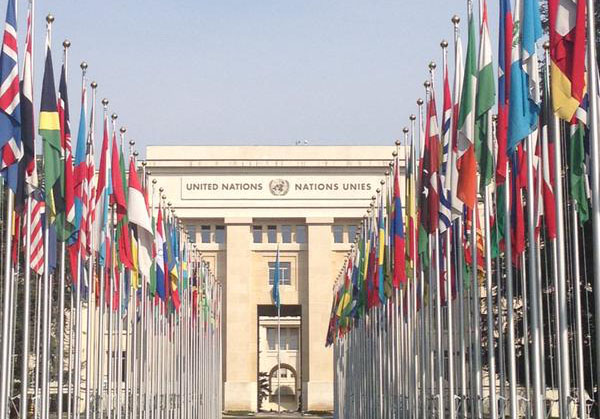
Jul 5, 2018 | Advocacy, Non-legal submissions
The ICJ today joined 91 other NGOs in calling on the UN Human Rights Council to act in response to the downward spiral for human rights in Venezuela.
The joint statement was delivered on behalf of the group by Human Rights Watch during a general debate (check against delivery).
“Spiralling downwards with no end in sight”: That’s how a group of UN Special Procedures, including the Special Rapporteurs on health, adequate housing, extreme poverty and food categorized Venezuela in January of this year. This is also the title of a report released by the OHCHR on June 22, which paints a devastating picture of arbitrary detentions and extrajudicial killings coupled with a severe shortage of food and basic medicines.
One Venezuelan mother interviewed by OHCHR said: “I have a little baby that cries and cries because I can´t feed her. The baby’s milk formula costs 3 million Bolivars and my husband only makes 1.2 million a month. (…) My neighbours told me that if I don’t vote for the Government they will take the food, the cash bonus and my house from me. They control the electoral authority, so they know for which party you vote.”
The UN Human Rights Council can no longer look away. Venezuela has spiralled into a human rights and humanitarian crisis that demands urgent action. The crackdown on dissent continues. The population has lost an average of 11 kilos in 2017. Most Venezuelans go to bed hungry, and according to the UNHCR, more than 1.5 million Venezuelans have fled the country, for reasons including political persecution, violence, and the ongoing humanitarian crisis. As a result, a 2,000 percent increase in asylum applications has been recorded across Latin America since 2014, and hundreds of thousands remain in an irregular situation, which increases their vulnerability.
Today’s joint statement delivered by Peru on behalf of 53 States adds to the chorus of international concern. The Human Rights Council also needs to step up and address the human rights violations suffered by the Venezuelan people at the hands of a member of this Council. We encourage continued reporting by the High Commissioner, and hope that today’s joint statement paves the way for the international investigation that the High Commissioner has called for and which is so desperately needed.
Acceso a la Justicia
Acción Solidaria
ACCSI Acción Ciudadana Contra el SIDA
Action for Solidarity
African Centre for Democracy and Human Rights Studies
ALAPLAF
Ana Belloso
ASOADNA
Asociación Civil Fuerza, Unión, Justicia, Solidaridad y Paz (FUNPAZ)
Aula Abierta
Canada Venezuela Democracy Forum
Cátedra de Derechos Humanos de la Universidad Centrooccidental Lisandro Alvarado
Center for Justice and International Law
Centro de Acción y Defensa por los Derechos Humanos – Cadef
centro de Derechos Humanos de la Universidad Metropolitana (CDH-UNIMET)
Centro de Derechos Humanos, Universidad Católica Andrés Bello
Centro de Documentación en Derechos Humanos “Segundo Montes Mozo S.J.” (CSMM)
Centro de Formación para la Democracia (CFD Venezuela)
Centro de Justicia y Paz – CEPAZ
Centro de Promoción y Defensa de los Derechos Sexuales y Reproductivos – PROMSEX
Centro para la Paz y los DDHH de la Universidad Central de Venezuela
Centro para la Paz y los DDHH Universidad Central de Venezuela
Centro Regional de derechos Humanos y Justicia de Genero: Corporación Humanas
Cisfem
CIVICUS
Civilis Derechos Humanos
Clínica Jurídica de Migrantes y Refugiados de la Universidad Diego Portales
Codevida
Comisión de Derechos Humanos de la Facultad de Ciencias Jurídicas y Políticas de la Universidad del Zulia
Comisión de Derechos Humanos de la Federación de Colegios de Abogados de Venezuela del Estado Tachira
Comisión para los Derechos Humanos del estado Zulia, Codhez
Comisión para los Derechos Humanos y la Ciudadanía (CODEHCIU)
COMITE POR UNA RADIOTELEVISIÓN DE SERVICIO PÚBLICO
Conectas Direitos Humanos
Convite AC
Coordinadora Nacional de Derechos Humanos
Defensa y Justicia Carabobo
Defiende venezuela
Dejusticia
Epikeia, Observatorio Universitario de Derechos Humanos
Espacio Público
EXCUBITUS derechos humanos en educacion
FADNNA
Federación interamericana de Abogados capitulo Venezuela seccional Anzoategui
Foro Penal
Franciscans International
Fundacion Aguaclara
Fundación Espacio Abierto
FUNDACION ETNICA INTEGRAL
Fundación Niños, Niñas y Adolescentes
Fundación para el Debido Proceso (DPLF)
Fundamujer
Humano Derecho Radio Estacion
Human Rights Watch
Iniciativa Por Venezuela
Institute on Race, Equality and Human Rights
International Commission of Jurists
International Movement Against All Forms of Discrimination and Racism (IMADR)
International Service for Human Rights
Ipys Venezuela
Juventud Unida en Acción
Laboratorio de Paz
Madres de Soacha (Colombia)
María Estrella de la Mañana
Maria Eugenia
Misión Scalabriniana Ecuador
Monitor Social A.C. (Venezuela-Edo. Nva Esparta)
Movimiento Vinotinto
Mulier
Observatorio de Derechos Humanos de la Universidad de Los Andes
Observatorio Venezolano de Conflictividad Social (OVCS)
Observatorio Venezolano de la Salud
Organización StopVIH
PADF Honduras
Padres organizados de Venezuela
Paz y Esperanza
Pedro Luis Echeverria
PEDRO NIKKEN
Prepara Familia
Promoción Educación y Defensa en DDHH (PROMEDEHUM)
Revista SIC del Centro Gumilla
Robert F Kennedy Human Rights
Seguridad en Democracia (SEDEM)
Sin Fronteras IAP
Sinergia, Red Venezolana de Organizaciones de la Sociedad Civil
Thais Parra
Transparencia Venezuela
UCV
Una Ventana a la Libertad
Unión Afirmativa de Venezuela
Union Vecinal para la Participación Ciudadana A.C
West African Human Rights Defenders Network
World Organisation Against Torture (OMCT)
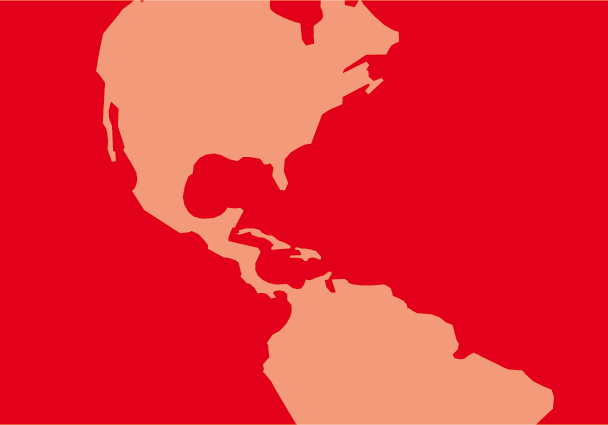
Jun 28, 2018 | News
On 24-25 June, ICJ Commissioners from the Latin America region came together in Bogotá, Colombia, to consider and enhance ICJ strategies to combat past and resurging trends in extrajudicial executions and enforced disappearances in the region.
The meeting was the first of its kind to bring together ICJ Commissioners on a regional basis: Carlos Ayala (Venezuela); Miguel Carbonell (Mexico); Gustavo Gallón (Colombia); Roberto Garretón (Chile); Juan Mendez (Argentina); Victor Rodriguez Rescia (Costa Rica); Alejandro Salinas Rivera (Chile); Mónica Pinto (Argentina); Belisário dos Santos Júnior (Brazil); and Wilder Tayler (Uruguay).
The meeting was followed by a preparatory mission (involving two Commissioners and the ICJ’s legal representative in Colombia) on the transitional justice mechanisms envisaged under the Havana Agreement, with a particular emphasis on the jurisdiction and operation of the ‘Special Jurisdiction for Peace’. A full high-level mission will follow in September, at which time the ICJ intends to identify minimum benchmarks for the effective operation and sustainable impact of those mechanisms.
In all regions of the world, recourse to enforced disappearances and extrajudicial killings continues; victims and their families (the overwhelming majority of whom are women, children and indigenous peoples from rural areas dominated by poverty and social and political exclusion, as well as trade unionists and human rights defenders) struggle to obtain prompt and effective remedies and reparation; and perpetrators enjoy impunity through inadequate or improper laws, ineffective institutional frameworks, selective recourse to accountability mechanisms and/or political interference in the functioning of those mechanisms.
The meeting confirmed that these challenges are particularly evident in Latin America, where there has been a resurgence in recourse to enforced disappearances and extrajudicial killings in countries throughout the region and where violations of the past have in very many cases been inadequately addressed. By way of example:
- In Brazil, official statistics from 2016 attest to the occurrence of 62,000 violent deaths and potentially up to 22,000 enforced disappearances each year.
- 45 years after the coup d’état in Chile, about 800 people have been convicted and sentenced to imprisonment, but those figures belie the extensive occurrence and levels of responsibility for gross violations of human rights that occurred.
- In Colombia, more than 70,000 cases of enforced disappearance were documented by the Attorney General for the period 1970-2015 and there is general consensus that the number of missing persons likely exceeds 100,000. The wide and persistent extent of extrajudicial killings has been noted by UN and Inter-American experts and bodies as well as the Office of the Prosecutor of the International Criminal Court.
- In Guatemala, only 34 convictions for conduct involving conflict-era violations have been secured, despite the fact that the internal armed conflict of 1960-1996 involved massive and systematic human rights violations. Impunity has undermined redress and accountability and severely weakened the prevention of violations, with the National Civil Police having recorded more than 25,000 people ‘disappeared’ in 2003-2014, more than half of which were women.
- Peru’s internal armed conflict of 1980-2000 resulted in more than 69,000 people killed and ‘disappeared’, but less than 100 convictions have been secured under the judicial subsystem established in 2004 that specializes in accountability for gross human rights violations.
- In Venezuela, civil society reports at least 12,000 real or perceived political opponents having been arbitrarily detained between January 2014 and April 2018; and almost 6,000 alleged extrajudicial killings between 2012 and 2016.
In all the countries from which the Commissioners originate, several common factors were identified:
- The intrinsic risks to continuation of and lack of redress and accountability for gross human rights violations posed by executive action that undermines the rule of law;
- Also inherent to the rule of law, the critical need for independent and impartial judicial mechanisms and individual judges and lawyers to allow for transitional justice, in particular for victims and their families to access effective remedies and reparation and for the holding to account of perpetrators;
- A high level of correspondence between impunity for gross human rights violations and the corruption of public officials;
- The increased, and in some cases extensive, recourse to arbitrary and detention, which in many cases precede and allow for the occurrence of extrajudicial executions and enforced disappearances;
- A similar inter-relationship between enforced disappearances and the occurrence of torture and other forms of ill-treatment;
- The detrimental impact to ensuring accountability for violations of the past when omitting non-State and paramilitary actors from transitional justice processes; and
- The increase in highly conservative (political and popular) sentiments and movements within the region and the corresponding need to tailor responses depending on the democratic versus autocratic nature of government and its institutions.
Noting that the ICJ has long sought to combat extrajudicial executions and enforced disappearances, including through the development of UN and regional instruments and standards and through its action in Latin America and the globe, the ICJ’s Commissioners urged the ICJ to continue and expand its engagement. Noting also the increasing call by local civil society actors for support and intervention by the ICJ, the meeting considered the organization’s role in seeking redress and accountability for, and prevention of, gross violations of human rights.
Commissioners reinforced, and commented on the effective parameters of, the ICJ’s strategic and victim-centred approach to address and prevent gross human rights violations, including extrajudicial executions and enforced disappearances. Having regard to the ICJ’s mandate and worldwide network of judges and lawyers, Commissioners emphasized the unique role that the organization has by grounding its work on the transformative role of the law, justice institutions and justice actors.
The particular means by which this role can be achieved by the ICJ were discussed against the background of recent and planned activities in the region and beyond. Commissioners overwhelmingly supported these plans and the Secretariat is now poised to continue implementation of its strategies in its current programmes of work and in the development of future projects.
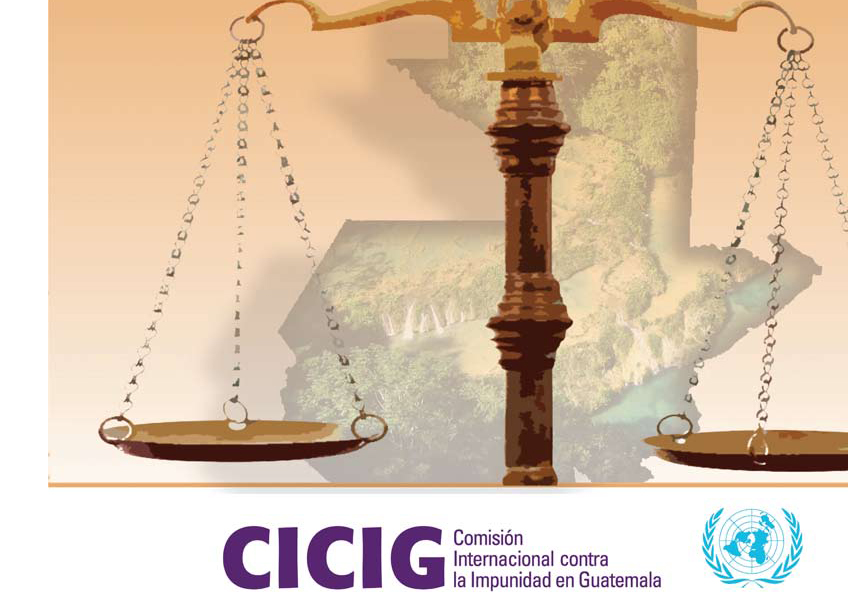
Jun 24, 2018 | News
“Judges from the High Risk Tribunals in Guatemala, including Ericka Aifán, Yassmín Barrios, Miguel Ángel Gálvez and Pablo Xitumul, are facing unjustified disciplinary hearings,” nine Latin American Commissioners from the ICJ, meeting in Bogotá on 24 June, stated today.
The Commissioners understand that these judges are facing unjustified disciplinary hearings instigated by groups or persons who are displeased with judicial rulings in high-impact cases involving transitional justice or corruption.
They expressed serious concern about the precarious state of the independence of the judiciary in Guatemala. Judges are subjected to on-going attacks that seek to impact their work as honourable and impartial justice operators.
According to international standards, judges should exercise their functions free of any extraneous influence and with total impartiality; without any limitations, inducements, pressures, threats or interference, direct or indirect, from any quarter or any reason.
The Commissioners also expressed their complete support for Commissioner Iván Velásquez, head of the International Commission against Impunity in Guatemala (CICIG), who because of the exercise of his functions, has also suffered from a series of hostile acts and smear campaigns.
The ICJ Commissioners extend their full support to the CICIG in its struggle against impunity and corruption.
The Commissioners request that the international community continues to support the CICIG with sufficient human and financial resources.
At the same time, the Commissioners call upon the Inter-American Commission of Human Rights, the Sub-Committee of Human Rights of the European Parliament and the UN Special Rapporteur on the Independence of Judges and Lawyers, to visit Guatemala and to verify “in situ” the precarious state of judicial independence in the country.
The nine ICJ commissioners who issued the statement
Carlos Ayala, Vice-President of the International Commission of Jurists (Venezuela)
Mónica Pinto, Commissioner (Argentina)
Miguel Carbonnel, Commissioner (Mexico)
Victor Rodriguez Rescia Commissioner (Costa Rica)
Wilder Tayler, Commissioner (Uruguay)
Belisário dos Santos, Commissioner Brazil
Juan Mendez, Commissioner (Argentina)
Roberto Garretón, Commissioner (Chile)









